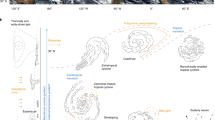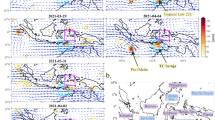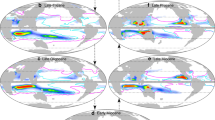Abstract
A RECENTLY completed investigation on cyclones has led, amongst other results, to one which throws an interesting light on a long-standing problem. One of the deductions of W. H. Dines from soundings of the upper air was that the air in the troposphere in depressions, particularly between 4 km. and 9 km., is on the average cold for its level, though this air is, on the whole, ascending. The paradox is to explain by what agency the ascent of relatively cold air is maintained. Dines's results related to depressions crossing the British Isles or Western Europe, that is, to depressions which as a rule were in the later stages of their existence.
This is a preview of subscription content, access via your institution
Access options
Subscribe to this journal
Receive 51 print issues and online access
$199.00 per year
only $3.90 per issue
Buy this article
- Purchase on Springer Link
- Instant access to full article PDF
Prices may be subject to local taxes which are calculated during checkout
Similar content being viewed by others
References
Proc. Roy. Soc, Lond., A, 93, 148 (1917).
Trans. Roy. Soc., Edin., 40, (1900–01). Proc. Roy. Soc., Edin., 36, (1915); Proc. Roy. Soc., Lond., 94, (1917–18).
Proc. Roy. Soc., Lond., A, 99, 397 (1921).
Author information
Authors and Affiliations
Rights and permissions
About this article
Cite this article
GOLDIE, A. Ascent of Air in Cyclones. Nature 138, 166–167 (1936). https://doi.org/10.1038/138166b0
Published:
Issue Date:
DOI: https://doi.org/10.1038/138166b0
Comments
By submitting a comment you agree to abide by our Terms and Community Guidelines. If you find something abusive or that does not comply with our terms or guidelines please flag it as inappropriate.



